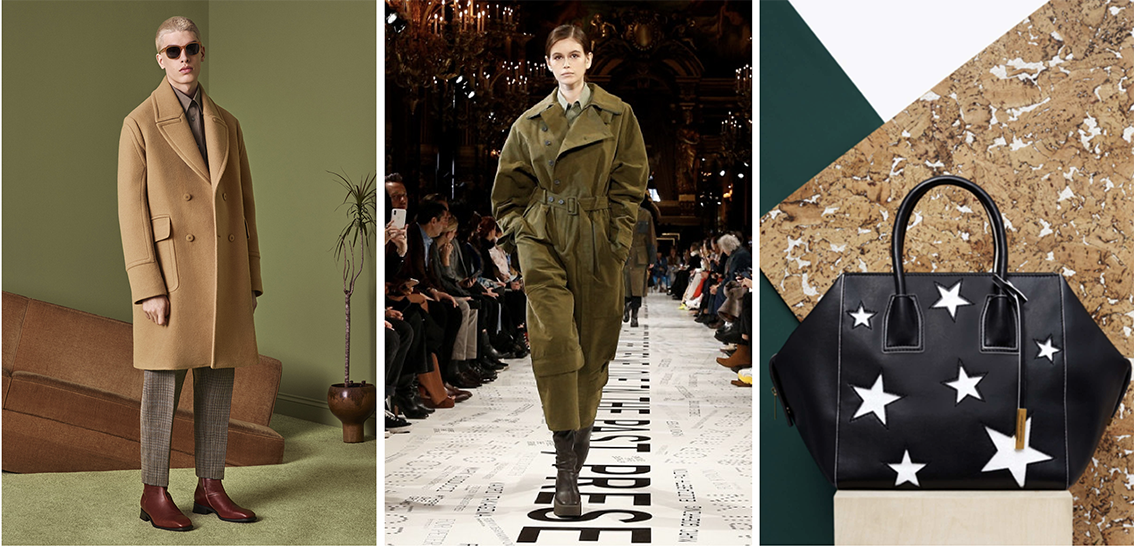Fashion's Sovereign Of Sustainability (16/04/19)

Stella McCartney (left), founder of her eponymous fashion house, recently said, "The starting point is not design, the starting point is sustainability." This belief extends from garments to store design, her newest London store (centre) being a monument to sustainability and including biodegradable mannequins and walls decorated with recycled paper pulp. (Images: www.vogue.com, www.wired.co.uk, www.google.com; graphic: Martin Jacobs)
“It takes 20 years to build a reputation and five minutes to ruin it,” stated business magnate Warren Buffett. In our social media era, his estimation of the duration it takes to ruin a reputation is entirely apt, for the viral power that social platforms hold means that consumer opinions comprising a reputation can be speedily altered. Conversely, the building of a corporate reputation is a lengthy and on-going process, and one which requires constant internal re-evaluation to ensure brand relevance and consumer buy-in. A negatively perceived product within a corporate portfolio can adversely affect other portfolio brands, especially within an organisation with a monolithic identity. It is, in part, for this reason that organisations have – concurrent with the rise of social media – realised the need for corporate transparency, and for brand missions that include ethical practices and sustainability acumen.
One such successful brand to accomplish this, to the point that social responsibility and sustainability have become inherent to the organisation’s ethos, is the English fashion house Stella McCartney. Named eponymously after the daughter of former Beatles member Sir Paul McCartney and his late wife, Linda, known for her animal rights activism, the organisation’s founder, McCartney, is a living embodiment (at corporate leadership level) of the brand’s mission.
Having identified a gap in the market for environmental accountability in fashion in a pre social media era, and when such concerns weren’t de rigueur as they now are, brand Stella McCartney has gained a loyal consumer following (including 5.8m Instagram and 1.3m Twitter followers) resulting in expansion, the brand now having 51 stores across the globe and distributing collections to 77 countries.
The organisation’s mission (which includes never using leather or fur, pioneering new alternative materials, and pushing towards circularity) directly impacts on the product. One need only enter a Stella McCartney store to witness this. Store design – which mandates the use of wood from certified sustainable forests, utilises recycled packaging and incorporates energy-saving LED lighting and solar panels – is as environmentally considerate as the garments are.
These are designed using materials created by biotechnologies which create synthetic equivalents to natural hides, silks and wools, and that are as luxurious as their natural counterparts, yet more sustainable.

The organisation has a monolithic brand identity, with menswear (left) and accessories (right) ranges introduced to the corporate portfolio to support and add value to the master brand, Stella McCartney women's Ready-To-Wear (centre). (Images: www.stelamccartney.com, www.google.com; graphic: Martin Jacobs)
Operating as a monolithic organisation, the brand’s corporate portfolio includes a Stella McCartney Women’s Ready-To-Wear brand (managed as the portfolio’s master brand, and fulfilling a strategic role), men’s and kids’ brands (both newer products introduced to strengthen the corporate brand), various accessories brands (the role of which is to penetrate other product classes), and the adidas by Stella McCartney sports performance collection (an alliance brand, strategic in its portfolio role because it appeals to a younger market). Following the initial launch of the Women’s Ready-To-Wear brand, these brand developments were introduced over a period of two decades, and managed in relation to one another, reflecting a long-term view of portfolio management.
Of greatest priority to the portfolio’s management are the Women’s Ready-To-Wear and adidas by Stella McCartney brands. This is where the organisation maintains its relevance – the former brand providing the organisation the opportunity to showcase its ingenuity in pioneering vegetarian and cruelty-free materials, and the latter affording the chance to demonstrate eco-conscious innovations in sportswear technology.
Both these product brands, along with McCartney’s outspoken nature on sustainability concerns, contribute to the organisation successfully delivering on its value proposition. This strategy has resulted in an excellent brand reputation, so much so that in 2012 and 2016 Stella McCartney was invited to be the creative director of Team Great Britain’s Olympic apparel.
This only served to strengthen consumer perceptions of the corporate brand. This positive audience regard for Stella McCartney’s transparency in reducing, reusing and recycling filters across all product brands within the corporate portfolio, casting them in an equally positive light, one of the advantages of a monolithic identity.
A fashionably quirky video, produced by the Stella McCartney creative team and uploaded to the organisation's website and YouTube channel, educates the consumer on the advantages of sustainable viscose. The brand leverages social media platforms to strengthen its already positive reputation.
Consumers browsing the brand’s website will find an entire section devoted to sustainability, detailing respect for nature, people and animals. This corporate pursuit isn’t treated as a subsidiary to the fashion, but rather designed in a holistic manner; sustainability is vital to the brand DNA, and therefore cohesively integrated.
Similarly, the Stella McCartney Instagram account (@stellamccartney) is an exercise in corporate transparency, with McCartney’s personal voice evident, and indicative of her own posting. Her voice is synonymous with the communicated and conceived identities of the brand, making it a welcome factor in creating brand resonance. McCartney’s visible involvement improves relationships with stakeholders, making the brand more attractive to suppliers, employees and consumers.
With McCartney vocalising her own and corporate values so publically, the organisation’s reputation is favourably boosted. As a guideline, the brand needs to be equipped to speedily address any negative backlash to these comments, should it occur. Similarly, in appealing to a younger market with the adidas collaboration, Stella McCartney may want to consider a bolder approach to announcing its sustainability initiatives so as to entice these consumers to its non-alliance brands. For these are the brands in the corporate portfolio that are truly rich with integrity that filters down from the ethical choices of its founder to the tiniest of details in garment construction and retail experience.
Martin Jacobs
(module 7, assignment 7.7)
Designer Stella McCartney is a media-savvy, outspoken advocate of ethical accountability and sustainability in the fashion industry. By supporting her causes (like the Leuser Ecosystem), globally adored celebrities including Oprah Winfrey and Justin Timberlake create emotional brand resonance for the consumer.
Bibliography:
Franklin-Wallis, O. Stella McCartney Is On A Quest To Save You From The Fashion Industry. Available: https://www.wired.co.uk/article/stella-mccartney-sustainable-fashion (2018, December 06)
Peoples, L. Is Stella McCartney The Ruling Queen of Sustainability? Available: https://www.refinery29.com/en-us/stella-mccartney-sustainability-fashion-brand-innovation (2018, August 08)
Cartner-Morley, J. Stella McCartney Leverages Star Power To Save The Rainforests. Available: https://www.theguardian.com/fashion/2019/mar/04/stella-mccartney-rainforest-paris-fashion-week-oprah-winfrey (2019, March 04)
Farra, E. “I Need A Few More Colleagues Linking My Arm” – Stella McCartney Sounds Off On Sustainability, Faux Leather, And The Lack Of Honesty Around Both. Available: https://www.vogue.com/article/stella-mccartney-sustainable-fashion-leather-conversation (2019, February 15)
Wolfe, I. How Ethical Is Stella McCartney? Available: https://goodonyou.eco/how-ethical-is-stella-mccartney/ (2018, July 23)
Quotation:
Stella McCartney: from
Who has been able to pick out the best product among those listed on this site?
ReplyDeleteeco-responsible fashion